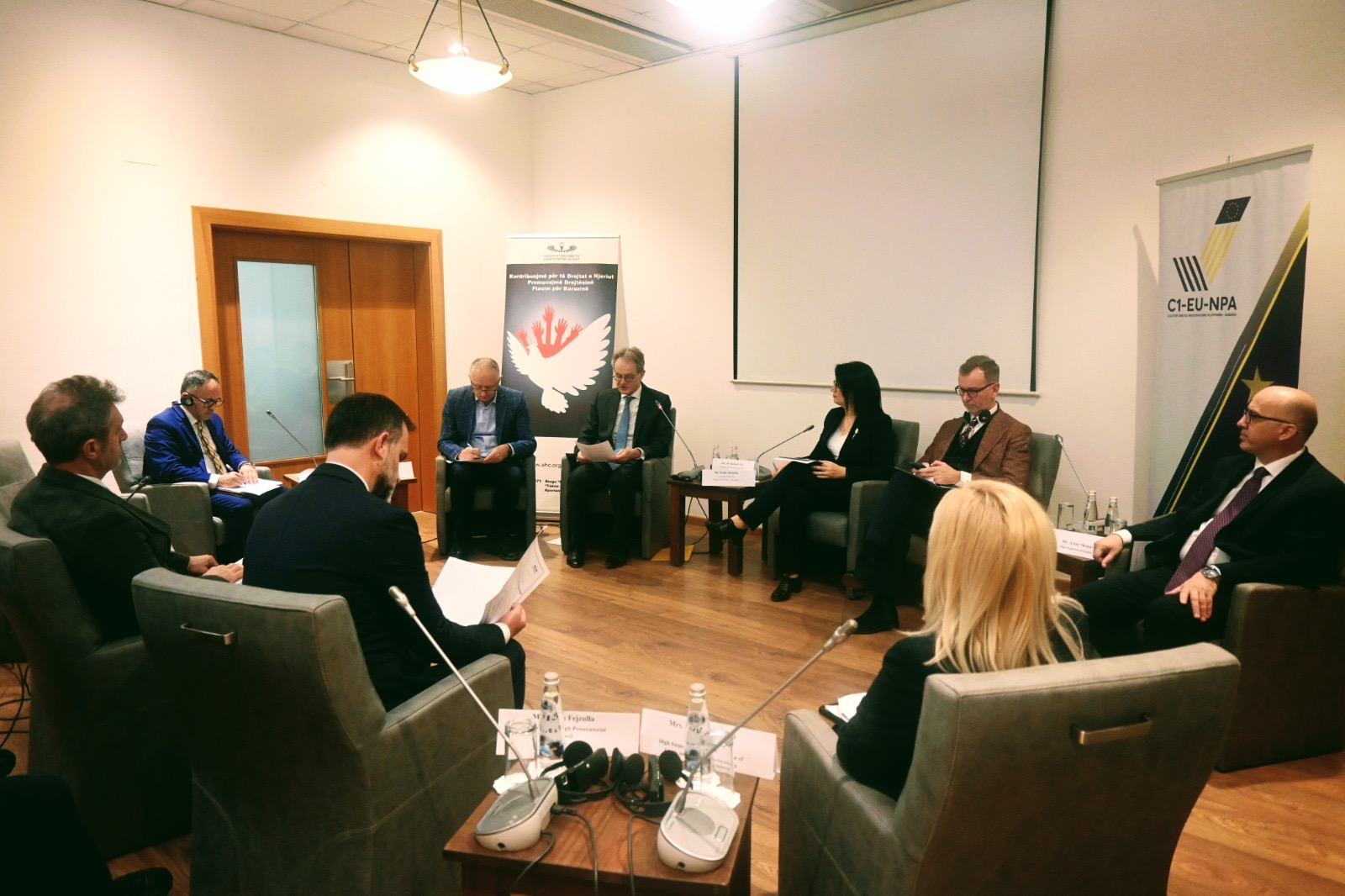The High Inspector of Justice, Mr. Artur Metani, participated in the roundtable discussion on the topic “The vetting process and its aftermath towards an independent, professional and accountable judiciary in Albania”, together with leaders and representatives of justice institutions and beyond, such as the High Judicial Council, the High Prosecutorial Council, the High Court, the High Inspectorate for Declaration and Control of Assets and Conflict of Interest, the Ombudsman, Civil Society organizations, etc., the Ambassador of the European Union and the Ambassador of the Kingdom of the Netherlands in Tirana.
The meeting was organized by the Albanian Helsinki Committee (AHC), which presented the Policy Document regarding the continuation and consolidation of the vetting process in Albania, with the support of the Platform of First Group-chapter. In his speech, Mr. Metani said among other things that “Since the establishment of the reformed justice bodies and continuing, the recruitment, career and accountability processes of magistrates are being implemented by these bodies, based on the legal provisions in force that regulate them. In addition to these practices already established by the justice bodies, the standards established by the vetting process also constitute a good and complementary model of the procedures that we follow today. Of course, the standards implemented by the vetting process, which was a sui generis, temporary and extraordinary process, cannot be used as a substitute for the work processes that we follow since the establishment of the justice institutions. The absorption of best practices implemented by vetting serves not only to increase the performance of the justice system, but also to consolidate our best common standards.
Speech by the High Inspector of Justice at the roundtable discussion “The vetting process and its aftermath towards an independent, professional and accountable judiciary in Albania”
Honorable Ambassadors Mr. Gonzato and Mr. Vos!
Honorable participants!
Thank you for the invitation and the opportunity to express some considerations regarding the document drafted within the framework of the activity of the vetting bodies in Albania.
Taking into account the fact that the purpose of this document is to improve the debate on the policies and accountability of the justice system, I highly appreciate the development of such activities, which promote direct discussions on those issues, which require special attention and an in-depth and qualitative analysis within the framework of their processing and implementation.
Since the establishment of the reformed justice bodies and continuing, the processes of recruitment, career and accountability of magistrates are being implemented by these bodies, based on the legal provisions in force, which regulate them. In addition to these practices already created by the justice bodies, the standards created by the vetting also constitute a good and complementary model of the procedures that we follow today. Of course, the standards implemented by the vetting process, which was a sui generis, temporary and extraordinary process, cannot be used as a substitute for the work processes that we have been following since the establishment of the justice institutions. However, the absorption of the best practices implemented by vetting serves not only to increase the performance of the justice system, but also to consolidate our best common standards.
This process of transferring these practices and standards is delicate and requires not only careful analysis, but also a coordinated plan of measures, both in the regulatory and administrative aspects. It requires a careful analysis of the competencies of each body, in the context of the inclusion of this transfer in aspects of asset check, integrity or professionalism.
The report presented today by the experts of the Albanian Helsinki Committee also serves this process. It is a considerable document, which contains a number of findings of a technical nature, regarding procedures and standards and highlights a number of issues. These issues have been raised at the discussion level and I believe that they constitute a good guide for the discussion on these identified problems, as well as a starting point for this process that we are talking about. Such a technical overview of the challenges of the vetting process definitely serves to improve standards and consequently also the unification of the practices of the institutions.
I would not like to dwell on the work processes of the High Inspector of Justice regarding the application of best vetting practices, as I think this is not the case, but
I would like to emphasize once again in the end that the development of this process on borrowing the best models or standards developed by vetting bodies requires increased attention and care on the part of justice institutions, to serve the unification of the practices of our institutions and the consolidation of our common practices.
Thank you


